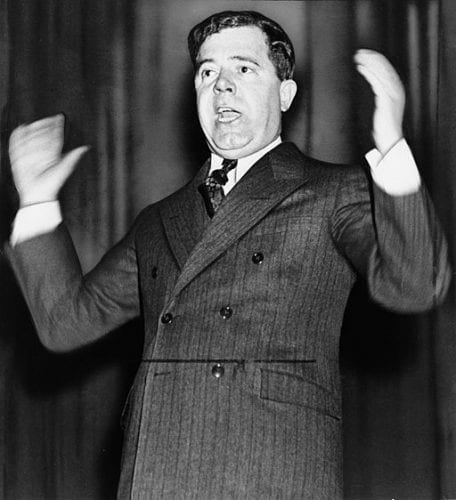Timely Ideas: Lincoln's Lyceum Address, Part II
On 27 January 1838, notable local lawyer Abraham Lincoln addressed the Young Men’s Lyceum in Springfield, Illinois. This social and civic organization was made up of prominent and would-be prominent young men of the town and surrounding area and served as a place where its members could listen to interesting and useful speeches and, it was hoped, learn how to become more thoughtful and wise members of the community.
Lincoln spoke that winter night on the topic of perpetuating the republic. In the first part of his address, Lincoln spoke about the lawless mob action he saw in America and the danger it posed to self-government. In the second part, he spoke about another danger. This arose not from the actions of the people, but from the ambition of their most spirited fellow citizens. Such people sought distinction above all else. Since the Founders in their day had won the distinction of establishing self-government, Lincoln thought that in his own time, an outstandingly ambitious person might seek distinction by destroying self-government, so he could rule on his own. He mentioned as examples famous destroyers of republics, such as Alexander, Caesar, and Napoleon.
Lawless mob action and republic-destroying ambition had a common character: a refusal to live within the law and the constitution. Moreover, Lincoln warned, the former would help make the latter possible both by undermining respect for the law and by making people fear for their safety and thus more likely to support someone who claimed he would restore order, but actually sought to destroy freedom.
It is good to be law abiding, but only if the laws are good. What do we do if they aren’t? As long as we can vote to change the law, we should obey it, until we can change it, Lincoln said. This was his approach to slavery. In his view, it was the least damaging way to deal with bad laws. It was a compromise, distasteful when justice is at stake, but necessary, Lincoln thought, to avoid the evils of both lawlessness and unthinking submission to unjust laws.
Lincoln’s advice about how to deal with unjust law remains relevant to our current concerns with injustice. What about his concern with the danger posed by the outstandingly ambitious?
Lincoln wrote at a time when the power of the national government most involved defending America from foreign powers. It was natural, therefore, that the examples that came to mind were renowned military leaders. Most historians believe that Andrew Jackson was the American example Lincoln was thinking of.

Today, however, government involves itself in all aspects of American life. In particular, it has become a guarantor of economic well-being, especially when emergencies strike. This precedent was set during the Great Depression. The Depression era also provides an example of the new kind of threat from ambition. Huey Long threatened the republic not by force but by a disregard for the conventions of democratic life. As Governor of Louisiana, Long used patronage, cronyism, and a variety of other measures to gain control over all branches of the state government, and then used the power of the government to crush anyone who opposed him. As U.S. Senator, he became an opponent of President Roosevelt, proposing a more radical economic program. He named his program “Share Our Wealth” and proposed confiscatory tax policies to accomplish that end. He barnstormed around the country, holding large rallies and using modern means of communication (radio) to stir up his followers and increase his support. His speeches were sometimes punctuated with personal attacks on opponents, and at least once on an ordinary spectator whose appearance he ridiculed. Long was contemplating a run for the Presidency in 1936, but died before the campaign began.
Does the advice Lincoln gave for dealing with the outstandingly ambitious still apply? Lincoln said in the Lyceum Address that when such a person arises, “it will require the people to be united with each other, attached to the government and laws, and generally intelligent, to successfully frustrate his designs.”
The last requirement for success against the designs of ambition—general intelligence—reminds us of the importance of educating Americans in the principles and practices of self-government.


